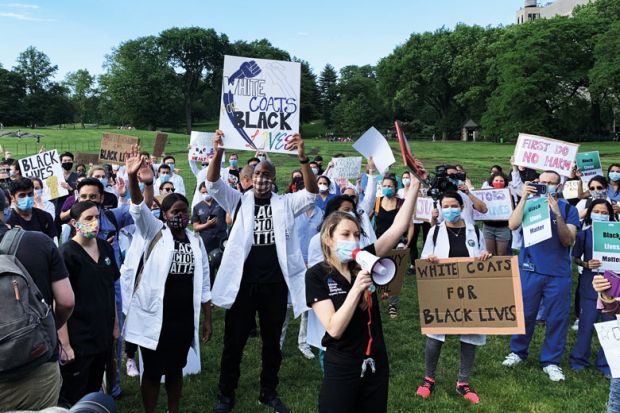US healthcare remains mired in racial inequities, with the nation’s medical schools persistently falling short in areas where they could be driving improvement, a top US medical journal has concluded in a broad assessment.
The Journal of the American Medical Association (JAMA), in a series featuring more than a dozen articles, described US medical schools as making important efforts recently to address racial inequalities − while also experiencing backsliding and managing little growth in black faculty.
One entry in the JAMA series found that the share of black faculty at US medical schools “increased only minimally from 1990 to 2020”, with no medical specialty having a share comparable with black people’s 13 per cent share of the overall US population.
Disparities in health outcomes across the US population, in turn, also showed no significant narrowing in race-related gaps between 1999 and 2018, according to another report in the series.
“As with all social change, courage is needed to move forward,” a group of experts from the University of Pennsylvania wrote in one of the analyses. “This courage, though, is most needed from leaders and colleagues in positions of privilege,” said the group, which included Kevin Mahoney, the chief executive officer of the University of Pennsylvania Health System.
JAMA issued its analyses only days after another leading research journal, Science, detailed a case of US university researchers allegedly risking the health of low-income black children in an asthma study in order to produce more compelling research findings − and suggested that such behaviour remains prevalent in academia.
That finding involved a 2016 study by a University of Pittsburgh professor, with $4.3 million (£3.1 million) in National Institutes of Health (NIH) funding, that tested 400 children, most of them black, to see whether additional vitamin D might help them avoid severe asthma attacks.
Half the children received a high-dose vitamin D supplement each day for a year, and the others were given a placebo. Outside experts told Science that the study instead should have given the other half at least some amount of vitamin D, given its importance to their health, rather than seek a more dramatic difference in the data.
JAMA published its series after having its own problems with racial understanding. The 138-year-old medical journal, one of the most respected publications in academic science, recently eased out its editor-in-chief, Howard Bauchner, a professor of paediatrics and community health sciences at Boston University, after he publicly denied the problem of systemic racism in medicine.
But such inequities are not unique to the US. On the same day that JAMA issued its series, a team of researchers based at the University of Cambridge published a study in BJGP Open describing a shortage of primary care doctors in socio-economically disadvantaged parts of the UK and called for greater recruitment in such areas by the nation’s medical schools.
The study by the Pennsylvania team described “an initial honeymoon period” for racial improvement across US higher education following the George Floyd killing, which included “grand press statements, new committees and an infusion of resources” for steps such as hiring diversity officers and boosting minority faculty numbers.
But such measures have encountered pushback, the authors said, especially as they can involve minority staff explaining structural problems to established white counterparts. “The teacher has become the pupil, and having to assume this role, being taught by younger, non-white people, can be so uncomfortable as to be threatening for some,” they wrote.
Officials at the American Medical Association did not respond to requests for comment. Officials at the NIH, which has announced a series of efforts in recent months and years to confront racism in its funding and operations, said they had no immediate response to either set of reports.
Register to continue
Why register?
- Registration is free and only takes a moment
- Once registered, you can read 3 articles a month
- Sign up for our newsletter
Subscribe
Or subscribe for unlimited access to:
- Unlimited access to news, views, insights & reviews
- Digital editions
- Digital access to THE’s university and college rankings analysis
Already registered or a current subscriber? Login







